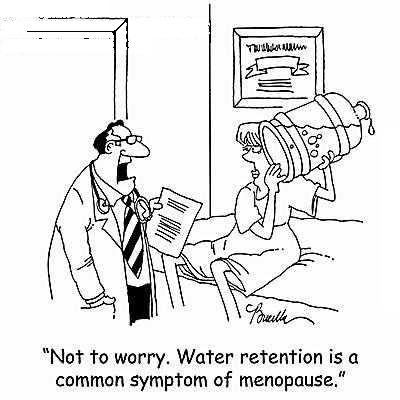Many different problems and conditions can cause edema (swelling due to fluid retention). Some causes involve lifestyle (diet, lack of exercise, alcoholism, occupations involving standing), some causes are hormone-related, especially in women, other causes are drug-related or the result of a serious medical condition. Here is a list of the most common causes of edema caused by water retention.
Eating Too Much Salt
Sodium intake is closely related to water retention and edema. Over consumption of salt is one of the commonest reasons why people retain excess fluid. Many experts tell patients with water-retention problems to eat fewer processed foods, add less salt when cooking and remove the salt shaker from the table. A good diet to follow is the DASH diet.
GravityProlonged periods of standing often causes fluid to ‘pool’ in the tissues of the lower leg.
Hot Weather
During periods of high temperatures, the body is less efficient at removing fluid from its tissues.
Burns/SunburnWhen burn injuries occur, the skin reacts by retaining fluid and this causes localized swelling.
Premenstrual Syndrome (PMS) Edema
Women have an increased risk of water retention, due to the rise and fall of hormone levels. For example, the reduction in progesterone, in the week before menstruation, can cause fluid retention. Some experts believe the problem is related to abnormal fluctuations in blood sugar. Others believe it is sodium-related. When your blood breaks down progesterone in the run-up to menstruation, the kidneys are told to retain water and sodium. As well as this, a water-retaining compound (an anti-diuretic hormone) may be secreted, which causes more water to be retained. Diuretic treatment is not beneficial for edema related to PMS.
Contraceptive Medication EdemaThe birth pill or any oral contraceptives that include estrogen can lead to fluid retention in some women. Weight gain (of up to 8 pounds) when first going on the pill is not uncommon.
Edema During PregnancyHormones released in pregnancy encourage the body to hold onto excess fluid. Pregnant women typically retain a significant amount of sodium and water. Some of this excess fluid is needed by the fetus and placenta. Swelling in the face, hands, lower leg and feet is typically seen in pregnancy.
MenopauseWater retention, causing bloating and edema can occur in menopausal women either during perimenopause or post menopause. Hormone fluctuations and estrogen replacement therapy are two common culprits.
 Nutritional Deficiencies
Nutritional DeficienciesDietary deficiency, like inadequate intake of vitamin B1 (thiamine) can cause fluid retention. Vitamins B6 and B5 also assist fluid dispersal. Low levels of protein (albumin) in the bloodstream may also cause edema.
Medication Side EffectsWater retention and edema may also be caused by drugs, such as high blood pressure medication (antihypertensives) and certain forms of steroid medications such as corticosteroids and nonsteroidal anti-inflammatory drugs (NSAIDs).
Medical ConditionsFluid retention may be a symptom of a more serious underlying medical condition. Here are the most common examples:
Chronic Venous InsufficiencyIn some patients, weak valves in the veins of the legs fail to return blood to the heart as efficiently as normal. The pooling of blood can result in varicose veins.
Chronic venous insufficiency may itself occur after the patient has experienced venous blood clots (deep vein thrombosis). Here, the swelling is usually limited to the lower extremities (feet/ankles) and may affect only the left or right side. Usually, other conditions cause swelling in both extremities.
Kidney Disease (Nephrotic syndrome and acute glomerulonephritis)Kidney disease can cause swelling in the legs and around the eyes. It is the result of an increase in pressure in the blood vessels, caused by the kidneys failing to excrete a sufficient amount of sodium and fluid. The fluid left behind raises pressure on the blood vessel walls, which induces fluid to move from inside the blood vessel to outside, leading to edema.
Heart Failure (Congestive Heart Failure)Heart failure can adversely affect the right hand chambers, whose function is to receive blood from the body and pump it to the lungs to be filled with oxygen, or the left heart chambers, which pump oxygenated blood to the rest of the body. If these chambers are unable to pump effectively, the body compensates by retaining fluid and increasing the volume of blood. This causes congestion of the veins, enlargement of the liver, and the accumulation of fluid in the abdominal cavity (ascites) and in subcutaneous tissues, causing swelling in the legs. Typically, right heart failure, leads to swelling in the legs and abdomen, while left heart failure causes edema in the lungs, or pulmonary edema, leading to shortness of breath.
Liver Disease - CirrhosisCirrhosis causes congestion in the liver which leads to an increase in pressure in the liver's blood vessels which backs into the blood vessels leading to the liver, causing ascites. This causes swelling in the abdomen, and in the feet or, if the patient is lying down most of the day, edema in the lower back (sacral edema).
Malignant LymphoedemaThis includes cancerous tumours that block structures of the lymphatic system, such as the lymph nodes.
Thyroid DiseaseAn example is hypothyroidism, usually treated with thyroxine.
ArthritisArthritic joints may swell with fluid, causing localized edema.
Allergic ReactionsPeople who are susceptible to allergic reactions may experience edema in response to particular allergens (eg. wasp sting). In some cases, the reaction is severe (anaphylaxis) and requires immediate medical attention. This type of edema is short-lived.

